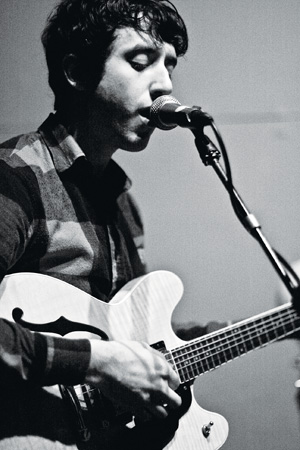

IF Evan Jewett’s solo project Family Room actually sounded the way he wanted it to, it would be an entirely different band.
“If I could wave a wand, it would sound like Gram Parsons,” Jewett says. “It’s for the best, ’cause I’m sure we sound more unique this way.”
Jewett, an avid country fan, instead writes songs that are much darker, more hopeless and far stranger than country music. Though the songs are rooted in country, they are obscured by spacey keyboards and guitar noises, soft airy drums (if there are even drums) and his own peculiar, bassy, wailing vocals, reminiscent of eccentric singer/songwriter Scott Walker.
What Jewett’s songs do have in common with country is simplicity. They are skeletal in nature, giving his backup band lots of room to give whatever treatment they want to each time they play the songs.
“It’s folksy and country-based,” Jewett says. “Most instrumentation changes a lot. Because the songs are simple, there’s a lot of space to change the sonic qualities.”
Initially, the songs varied so much because the people who played with Jewett changed from show to show. Jewett played some shows alone, other shows he would play with whatever friends were willing to back him up. “It depends on who is playing with me, ’cause certain people are good at certain things,” Jewett says.
Even as his backup musicians became more consistent, that freedom and fluidity would become a defining element of Family Room.
It’s the exact opposite of his other band, Worker Bee. Loved in the South Bay, Worker Bee are a loud, noisy, energetic and precise musical outfit. “It takes hours and hours to get the drum parts appropriate. We spend hours repeating parts. An entire song can hinge on one guitar part. Once we have everything, we don’t really want to change it.”
Since 2005, Worker Bee have brought their melancholy yet melodic, guitar-looping indie rock sound to San Jose and beyond, receiving much acclaim. Worker Bee started out instrumental, but as Jewett became more comfortable singing, he took the reins as lead singer. That opened the door to something he long wanted to do: record a solo album.
He got the opportunity a few years later after moving to Oakland, where he was free from distraction.
“In Oakland I had no friends. I’d go to my job and that was it. I didn’t hang out with anyone,” Jewett says.
The dark, dreary and intimate quality of the Family Room record took Jewett a year of recording in his “closet-sized studio apartment” in Oakland. A few friends contributed parts, but most of it is all him. At the same time, he started playing shows as Family Room.
When Jewett writes songs with Worker Bee, he generally brings guitar parts and ideas to the group so that they can collaborate together. Their sound is defined by the communication and interplay between instruments. Family Room, on the other hand, is Jewett going deep inside of himself.
“Worker Bee is much more of a band. Family Room is much more of me sitting around being weird,” Jewett says.
Generally, Jewett prefers to play with collaborators, rather than solo. But he technically has no set band. People are free to come and go as they please. What doesn’t change is the haunting, moody feeling of his songs. Family Room sounds almost doomed, but it’s not unpleasant. It’s more like someone numbed on pain killers. The songs drift and wander slowly in despair. While the structures are simple, the layering is complex.
Now living in San Jose again, Jewett likes the way both of his bands fulfill parts of his creative needs. “I try to do both constantly. I don’t really favor one more than the other,” Jewett says.
He’s also started playing second guitar for Sacramento experimental rock band Tera Melos, but only when they tour. With all these different musical outlets, it seems there is a home for all of Jewett’s different ideas. It’s a good thing he didn’t settle for writing Gram Parsons songs.
Family Room
Wednesday, April 6, 9pm, free


